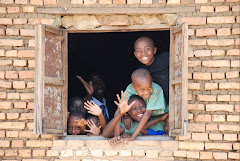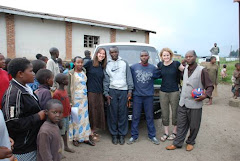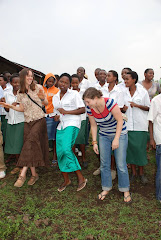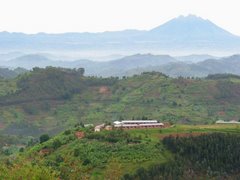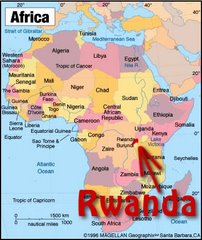Saturday, September 22, 2007
Home Again, Safe and Sound???
Tip Top Of Africa ~ Climbing Kilimanjaro
Saturday, July 21, 2007
Human Transit
Friday, July 20, 2007
Naming Ceremony, Development, and Daily Living
I have two days left in Rwanda and I am starting to realize that this enduring country has crawled beneath my skin. It is a tumultuous relationship though. Daily I experience things that make my stomach turn and my heart ache at the same time. The natural beauty of the country, as one example, brings peace to my soul. Yet, then I look more deeply at the terraced landscape covered with agricultural crops, the thick smog hanging in the air, the litter scattered about . . . the utter devastation of development. This country is panting to keep up with a 3.2% population increase in what is already the most densely populated and one of the poorest countries in African. They are racing to develop, but what does development mean: advancement, environmental destruction, a standardization of culture? There is a shopping center in the center of Kigali which we have termed “Muzungo Land” of white man’s land. It is swarming with Westerners who are here to do research, to vacation, to develop Rwanda! Cross cultural exchange is vital to our global society, but I am becoming a skeptic on development. Rwanda is receiving a great deal of international aid and they are talking about sustainability and development by the year 2020. They are racing and panting. It is an amazing duality of looking at a country which is trying to develop in two realms: Rwanda is developing its post genocide capacity while also trying to meet the UN Millennium Development Goals. Conflict and poverty are in such an intimate dance; to address the roots of genocide is to address global poverty, and the question of how to address poverty and development still remains
Today, a typical day, consisted of waking up to the soft singing of the nuns in morning prayer, a delicious pot of African Tea at a nearby restaurant, meeting with the director of Fight Illiteracy Youth Organization, interviewing the director of an orphanage, helping to write a family planning proposal with Health Development Initiative, crowding onto a mini bus to go downtown, weaving through a local market and holding on tightly to my money belt, negotiating a bus ticket to Nairobi with a women who would nod every once in a while to confirm that she was actually alive, blowing my nose to find black snot, being serenaded by honking horns as I dash across the relentless traffic, and all the while walking everywhere and hearing calls of “Good Morning Muzungo! (white person)”
Thursday, July 19, 2007
Rwanda as a Solo Female!
Saturday, July 14, 2007
Ideas in Action!
- Delegates are working with a Rwandan NGO called Amahoro Great Lakes to create a sister school program between Rwandan school and American schools. The idea is that we will use curricular information about Rwanda in American schools to raise awareness and to connect youth from both countries. We hope that youth in America will take interest in helping to raise funds for the impoverished Rwandan schools and that American youth will additionally work to generate a greater understanding about human rights around the world.
- Another related project idea is looking to raise funds for a scholarship program to help send qualified Rwandans to university. We would also like to extend this fundraising project to an orphan population with whom we all fell in love. Uyisenga N'Manziis a village for orphans of the genocide or HIV/Aids. It is distinctly different from an orphanage in the sense that the individuals become the heads of their households and learn autonomous living (I was impressed and slightly embarrassed as I thought of my recent return to living at home as an "adult"). We hope to help sponsor some of these orphans through school.
- A pressing issue in Rwanda is a high illiteracy rate. Illiteracy and ignorance played a destructive role in allowing the genocide propaganda to spread quickly and effectively. Fight Illiteracy Youth Organization is committed to promoting literacy and cultivating critical thinking. Yet, due to a lack of funding FIYO has had to close down eight of their literacy centers in the past year. Last year's GYC delegation put together a documentary on FIYO's work and this year we are hoping to hold screenings across America to help raise funds to keep the literacy centers up and running. It is estimated the $12.50USD will put a student through an eight month literacy course. Oh, and did I mention that FIYO also provides it's students with vocational skills like the fuel efficient stoves I mentioned in a previous blog entry!
- Some of us are teaming up to write a curriculum on peace and reconciliation for high school/middle school students. This idea was inspired by an innovative organization, Radio LaBenevolencia, which uses a radio soap opera to talk about pre and post genocide Rwanda. LaBenevolencia is sponsored by the psychology department at Yale University and is based strongly on the principles presented in a book called, "Roots of Evil" by Ervin Staow(sp?). I love the idea of using drama and fiction to discuss human conflict, even basic conflict between adolescents in the hallways of American schools.
Well, a lot of ideas. I am glad that I still have some time in Rwanda! I invite ideas, comments and a critical analysis of our proposals. Many of them are focused on fundraising, unfortunately, but we are really trying to promote education and to cultivate awareness.
Maramutzi (Good Night)
Friday, July 13, 2007
Thank You!
In response to the Murambi Memorial. I have been tossing and turning about the event and about my blog entry. I fear that I sensationalize the genocide when describing the memorial; focusing on number and horrific descriptions. This feels insensitive, but I need to try and show through my words the unbelievable atrocity that occurred. If everyone were to see, smell, hear, and feel what went on in Rwanda 13yrs ago I think we would all step back and analyze our role as global citizens. On a more personal level though, as I live in this sensitive society, I can't help but reflect on my personal actions. Every action we take, every word we speak has an effect. If we all are conscious of how we are impaction those around us, we just might begin to create waves of change. One by one, humans can move towards a more compassionate, considerate, respectful, and peaceful existence. There are plenty of times during the day when I become frustrated by the crowd around me pushing and shoving, or the taxi that is crammed full of 17 sweaty and smelly bodies, or the restaurant that takes two hours to prepare my dinner. All eyes are on me though, looking to see how I can respond. I did not intend for this sound preachy. It's just that being in another country, a country that has experienced the worst of conflict, and on a continent which has been labeled as uncivilized has helped me to feel the meaning of humanity and of a human existence. From conflict may we learn to appreciate peace; from death may we learn to value life; from anger may we learn to act with compassion and understanding.
Back to the memorial topic. As I walk through one memorial after another I wonder who the memorials are for and what message they are trying to send. Some of the memorials are in memory of those who lost their lives; others are to be a shocking memorial of the actions taken out by the killers. The later memorials do not seem to be for Rwandans or for morning, they seem to call upon the conscious of the world. When I am as these sites I feel angry and guilty. Angry at the human potential for evil, angry that the world let this evil dominate, angry that situations of desperation that push people to act out violently still exist, angry that the privilege can make a big difference with little sacrifice, and guilty for being a human and for carrying this potential for anger, evil, and silence. I am not being silent now though. After experiencing Rwanda, I am going to shout until my voice becomes hoarse. You all are listening and I appreciate that more than I can express, but I hope that we can work together to put action behind our voices.
Speaking of voices, yesterday I heard the voice of political reconciliation. We had the privilege of attending a Gacaca. Gacaca is the ancient court method that Rwanda readopted to help deal with the vast number of perpetrators. Thirteen years later and they are still having hearings. The literal meaning of the word means something like grass, community and unity. The perpetrators are brought forth to be tried by their community. The purpose of a Gacaca is to bring unity and for the perpetrators to come forth and ask for forgiveness. It is one way that the people of Rwanda are healing deep wounds and looking for reconciliation. This paragraph does not do justice, but I am running out of time. Please ask questions because the intent of Gacaca is noble, but it also has its flaws.
My love to all! Amahoro, peace
Monday, July 9, 2007
Sunday, July 8, 2007
Rwandan University Life
I too am struggling though with how to process the emotional impact of seeing the destruction of a human life. This weekend, my cup over spilled. Murambi Memorial, the most graphic and overwhelming genocide memorial. Murambi is a village high up on a scenic plateau. It used to be the site of a rural secondary school. During the genocide, Tutsi’s and moderate Hutu's were told to take refuge in the school; they were informed that they would be safe. Nearly 50,000 people fled to the school but they were not safe. The sheer number of victims was overwhelming; the natural beauty that silently witnessed the massacre was disturbing; our tour guide who was the only surviving member of his family and who has stayed on as groundskeeper ever since 1994 was painful; the plaque recognizing the site where French troops had played volley ball during Operation Turquoise was enraging(Operation Turquoise is an infuriating research topic for anyone interested in learning more about the international role in the 1994 genocide. A French documentary entitled Operation Turquoise was being filmed in Butare during our stay and should be out soon); the memorial was more than my soul could take. Like other memorials, the site remained untouched and unchanged. Yet, at Murambi the victims had not been moved. The last moment of life was seen on their mummified faces. I could never be prepare to face what I saw as I walked into one room after another. The odor was overwhelming, but it was not the odor of death, it was the odor of sheer evil. I wish I could end by saying a blank comment like, may they rest in peace, but I fear that the victims do not rest in peace.
Thursday, July 5, 2007
Education in Rwanda
To Congo and Quickly Back
Gysini, Rwanda is on Lake Kivu and shares a boarder with Goma, Congo. Travel across the boarder is unadvisable, but we organized a guide to take a group of us across for the day. The Rwandan genocide of 1994 is not a closed issue; it has merely spilled over the boarder into Congo. The Hutu militia, Interhamwe, has fled into the DRC and continues to violently target various groups within the Congolese population. Yet, such stories are only a peep in the international media. As we walked across the boarder, I could feel a change in atmosphere. The people were visible upset by our presence and would glare as we walked by. Goma is still in a state of utter disarray ever since the 2003 volcanic irruption. A line runs though the town outlining the destructive lava flow. In addition to the piles of volcanic destruction, the streets were absolutely littered with trash. Amidst the trash, ostentatious homes spotted the streets. The severe separation between economic classes made my stomach turn. A haunting billboard displayed a picture of a Caucasian baby advertising diapers yet the children scampering around on the streets rarely even had shoes or pants. Mercedes sped about the streets and in the driver’s seat was often a male of Indian or Middle Easter descent. The blue-beret UN official that marched around were also mostly from India and the Middle East which I flagged mentally as a further research topic? The UN seems to hold a strong presence, in Goma at least. Countless UN vehicles went back and forth along the main street and a UN sponsored refugee camp was tucked in between the lake and the Rwandan boarder. The condition of the camp seemed to be nice, especially in comparison to the refugee camp we had visited the previous day on the Rwandan side.
I just read a statistic placing Rwanda as the poorest country in Eastern Africa. The level of development in Rwanda is remarkable given socio-political strife but they really have no internal industry. The only substantial export is coffee, yet the country does not have the infrastructure to process and distribute what they grow. Economic development is a priority amongst the entire population. In the case of DRC, it is one of the most resource rich countries in all of Africa and yet it reeks of corruption. Rwanda: violent conflict amongst a population struggling under the weight of severe poverty and resource scarcity; Congo: violent conflict amongst a population cursed with resource abundance. There is so much I have to say, all for now though.
Amahoro (Peace)
Wednesday, June 27, 2007
Nyamata Memorial Visits
Juxtaposed to the memorial sites, we visited a couple different development project sites. The first was near-and-dear to my heart. It was a NGO and government sponsored project to help fight poverty and malnutrition by building sustainable stoves. The stoves were made out of a creative mixture of sand and mud that with a limited amount of heat could stay warm for hours. This project has supplied people with jobs, clean boiled water, and they use about ¾ less firewood which is a benefit to the environment and also to the women and girls who have to go far distances to collect firewood. Now, instead of collecting wood, the girls are able to go to school! Some of the villages nearby have received large stoves in the school so that the children are able to receive sustenance during the school day. Amazing huh! When asked how the stove project has helped to create peace and reconciliation, the villagers responded that making the stoves has pulled them together and has given them hope for the future. Their children study together and are growing into a collaborative existence.
Sunday, June 24, 2007
A Portrait of Kigali, Rwanda
In the furry of my thoughts, in the previous entry I failed to introduce you to my temporary home so welcome to Rwanda!
Sitting and watching the street activity has given me one of the most poignant summaries of the country, its history, prospects for the future, and of Rwandan living. The city streets weave around lush, green, hilly country side. The cool climate and green beauty has surprised and impressed me almost as much as the beauty of the people.
I don’t always feel welcome though. As I walk down the streets I am greeted by calls of mozungo-white person. The first time I heard this title used I was out for an early morning walk. I hung my shoulders and wanted to pull my black jacket up over my face. I felt targeted, uncomfortable, and like an invader. Accenting physical differences to create separation/segregation is painful. In that moment of personal discomfort I experienced the years of pain and segregation that the Rwandan people have carried. As I turned to find my caller I spotted an elderly man grinning with a toothless smile and waving energetically; my pain was self-imposed. Since then I have been hollered at countless times. Sometimes in a friendly/curious manner and sometimes it is yelled from behind a frown and stern eyes. The white skin of German, French, and
Saturday, June 23, 2007
I have arrived!
I am about to finish my first week in this remarkable country and I have much to share. My mind and heart are teeming. Where to begin?! Our delegation took the first few days to become oriented with our purpose here and with the city of Kigali. During one intensely memorable day, we went from visiting the Kigali Genocide Memorial to a reception at a primary school. The memorial site was emotionally overwhelming. I walked away feeling confusion, resentment, anger, sadness, pain, disbelief, guilt, and overwhelming grief.
While in a conversation with a young Rwandan man, the topic of the 1994 genocide came up and he hung his head while asking: “What does the outside world think of a country in which the people killed their own neighbors, teachers, doctors, brothers, wives, and children?” The pain and guilt that saturated his question made my heart ache. What do I think? What I have seen and experienced is a country of great resilience. The Rwandans are dealing with a tragic history in a manner that in commendable. The government has abolished the death penalty exposing the human ability to forgive; and the citizens have enacted a judicial system (Gacacas) which looks to have the people try one another and then reintegrate the genocidiares back into the society.
Ever since stepping off the plane, I have been received with open arms. Slowly I have accepted this warm reception. The first morning I timidly poked my head out of the steel gate which surrounded our lodging. My eyes rested upon a whole new world, but as I blinked and looked again I realized that it is not all that different. There are elements of humanity that cross all boarders, oceans, and time-zones. We are in this experience called life together, how amazingly exciting! Stay posted for more! Now that I have figured out the internet situation, I hope to make more frequent postings.
Amahoro (Peace)

